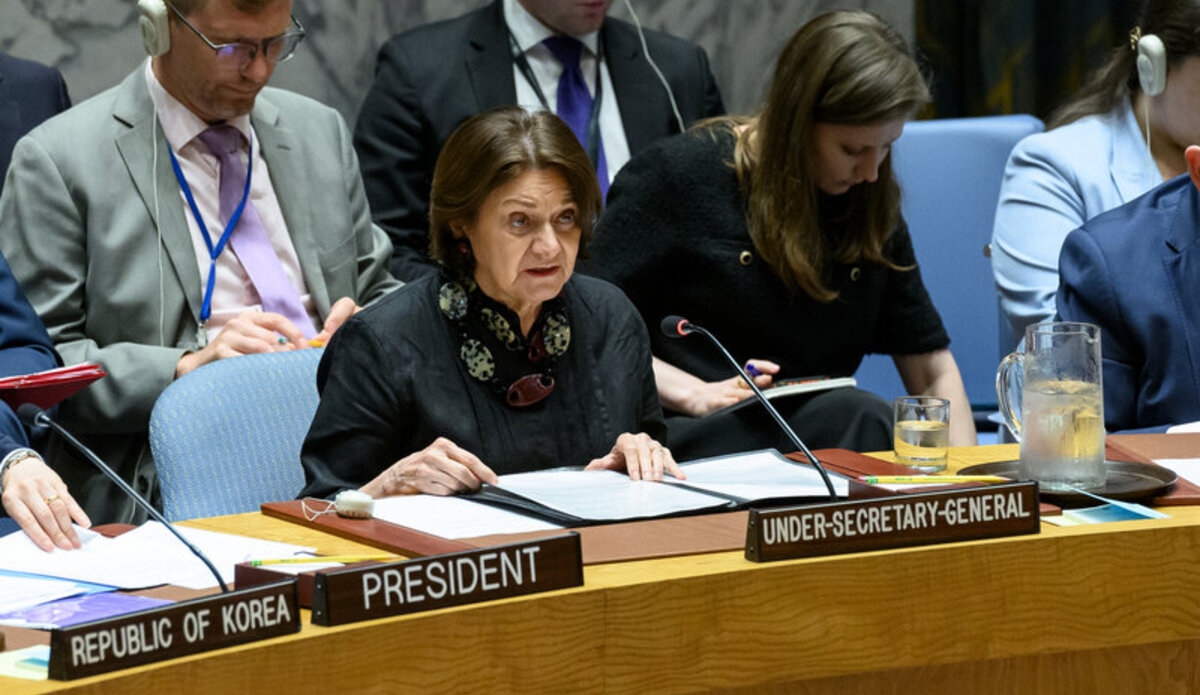UNDER-SECRETARY-GENERAL ROSEMARY A. DICARLO’S
REMARKS TO THE SECURITY COUNCIL ON NON-PROLIFERATION
(IMPLEMENTATION OF RESOLUTION 2231 (2015))
New York, 24 June 2024
Thank you, Mr. President, for the opportunity to brief the Council on the Joint Comprehensive Plan of Action (JCPOA) and the implementation of resolution 2231 (2015).
As the Secretary-General stated in his report, restoring the Plan and resolution 2231 (2015) to their full and effective implementation remains, unfortunately, elusive.
The United States has not returned to the Plan, nor has it lifted or waived the unilateral sanctions it reimposed after its withdrawal from the Plan in May 2018, or extended waivers regarding the trade in oil with the Islamic Republic of Iran.
The Islamic Republic of Iran, also, has not reversed any of the steps inconsistent with its nuclear-related commitments that it has taken since May 2019.
During the reporting period, the Secretary-General received several letters from JCPOA participants conveying their diverging views on the current impasse.
In a joint letter dated 3 June, the Permanent Representatives of France, Germany and the United Kingdom stated that Iran’s nuclear escalation had [quote] “hollowed out the JCPOA, significantly reducing its non-proliferation value” [end quote].
These countries restated their concerns about Iran’s violations of the JCPOA, specifically those related to the country’s increasing stockpile of enriched uranium and manufacture and use of advanced centrifuges.
They stressed that the current state of Iran’s nuclear programme, coupled with recent public statements made by Iran regarding its technical capabilities to produce nuclear weapons, were especially concerning given the expected termination of resolution 2231 (2015) in October 2025.
The Permanent Representative of Iran responded in a letter dated 5 June that his country’s reduction of nuclear-related commitments following the US withdrawal from the JCPOA was in compliance with the terms of the Plan.
The Permanent Representative wrote that France, Germany and the United Kingdom had failed to uphold their sanctions-lifting commitments related to Transition Day.
He described the concern raised by these countries regarding the termination of resolution 2231 (2015) as “misleading” and “provocative”.
Further, the Secretary-General also received a letter from the Permanent Representative of the Russian Federation, as well as a joint letter from the Permanent Representatives of China, Iran and the Russian Federation, both dated 12 June.
In their view, the US withdrawal from the Plan and re-imposition of unilateral sanctions, as well as the decision of some Member States to maintain national sanctions after Transition Day, were the cause of the ongoing deterioration of the JCPOA.
These representatives recalled their collective efforts to restore the Plan and noted that a fully operating JCPOA would serve as assurance to the international community.
These letters were not received in time to be included in the Secretary-General’s report.
Mr. President,
In its most recent report dated 27 May 2024, the International Atomic Energy Agency observed again that, regrettably, its verification and monitoring continues to be [quote] “seriously affected by the cessation of Iran’s implementation of its nuclear-related commitments under the JCPOA” [end quote].
Furthermore, while the Agency had not been able to verify the total stockpile of enriched uranium in the country since February 2021, it estimated that Iran maintains a total enriched uranium stockpile thirty times the amount allowable under the JCPOA.
This includes increased quantities of uranium enriched to 20% and 60%. Such a stockpile of enriched uranium and level of enrichment remain very concerning.
The Agency also issued an ad hoc report, in which it described Iran’s intention to commence previously declared enrichment activities, in excess of its JCPOA limits.
This update was circulated to the Council after the Secretary-General’s report had been finalized.
Mr. President,
I would like to now turn to the restrictive measures set out in annex B of resolution 2231 (2015). At this juncture, the only restrictive measures that remain in effect pertain to nuclear activities and transfers.
These measures will remain in place until October 2025, unless otherwise directed by the Council.
No information regarding actions alleged to be inconsistent with paragraph 2 of annex B were brought to the attention of the Secretariat during the reporting period.
Meanwhile, there were again no new proposals submitted to the procurement channel in the last six months in this reporting cycle.
The Security Council, however, received fourteen notifications regarding the nuclear-related restrictive measures for certain activities consistent with the Plan.
The decision to renew waivers for nuclear non-proliferation projects foreseen in the Plan and the nuclear-related provisions in annex B to resolution 2231 is under review by the United States.
Mr President,
In closing, I would like to echo the Secretary-General’s call for participants to the Plan and the United States to pursue all possible avenues for dialogue and cooperation.
In the current climate, it is crucial to prioritize multilateralism and diplomacy, and to set a course that promotes peace and security.
I would also like to thank Her Excellency Vanessa Frazier for her leadership as Facilitator for resolution 2231, as well as the Coordinator of the Procurement Working Group of the Joint Commission for our continued cooperation.
Thank you, Mr. President.

